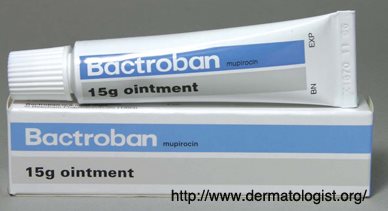Bactroban Dosage
A brief guide to Bactroban dosage

Issued to patients with bacterial infections on their skin or in their nasal passages, the prescription medication Bactroban is designed for short-term usage. Bactroban dosages are standardized for both the cream form of this drug and the ointment specifically designed for nasal use. While overuse of neither is dangerous, it may lessen the efficacy of the medication by making bacteria resistant to it. Therefore, it is important to follow instructions regarding Bactroban dosage intake in order to expedite treatment.
If you are prescribed the drug in a cream form, treatment should take place three times a day. While a physician may provide further specifics about Bactroban dosages, you should be able to intuitively determine the correct use. When you have applied enough of the medication to create a thin film over the area which is affected, this should be the correct Bactroban dosage. Ask a physician whether they recommend that you apply a bandage or gauze after this treatment. Bactroban dosages of this drug are dispensed in tubes containing 22 grams.
People who are prescribed the drug for nasal use will receive the ointment in tube form. Each tube contains one Bactroban dosage. To use the medication properly, half of the tube should be squeezed into each nostril. Once these Bactroban dosages have been applied, rub the sides of your nose for a minute to help their spread. This Bactroban dosage should be applied twice daily.
Regardless of the form of the drug you are prescribed, you should be on alert for the same allergic reactions. People who are allergic to the drug's components may experience skin irritation, tongue swelling or difficulty breathing regardless of the form of their Bactroban dosages. If this is the case, seek immediate medical attention. Generally, this will be a sign that physicians should cease the prescription of any Bactroban dosage.
A physician should clearly outline all of these potential issues before prescribing Bactroban dosages. You should also report any increased irritation or sensitivity that occurs after taking a Bactroban dosage. Manufacturer instructions recommend that you cease intake of the drug if this occurs without waiting to consult a physician.
Sometimes physicians may prescribe Bactroban dosages of cream to treat acne. Keep in mind that this is not an FDA approved use of the drug. A physician should clearly explain their proposed treatment strategy when issuing you a prescription for this type of Bactroban dosage, which will be applied in the same way as it would be during a bacterial infection.
Though it is extremely unlikely that Bactroban dosages will lead to severe side effects that are not warned against in the manufacturer's instructions, maintain copies of receipts concerning the purchase of the drug and a physician reports regardless. These will be important if you must substantiate your claims regarding adverse effects at a later date. Self-representation in such cases is not advisable, as the law is highly complicated and difficult for non-attorneys to practice correctly.